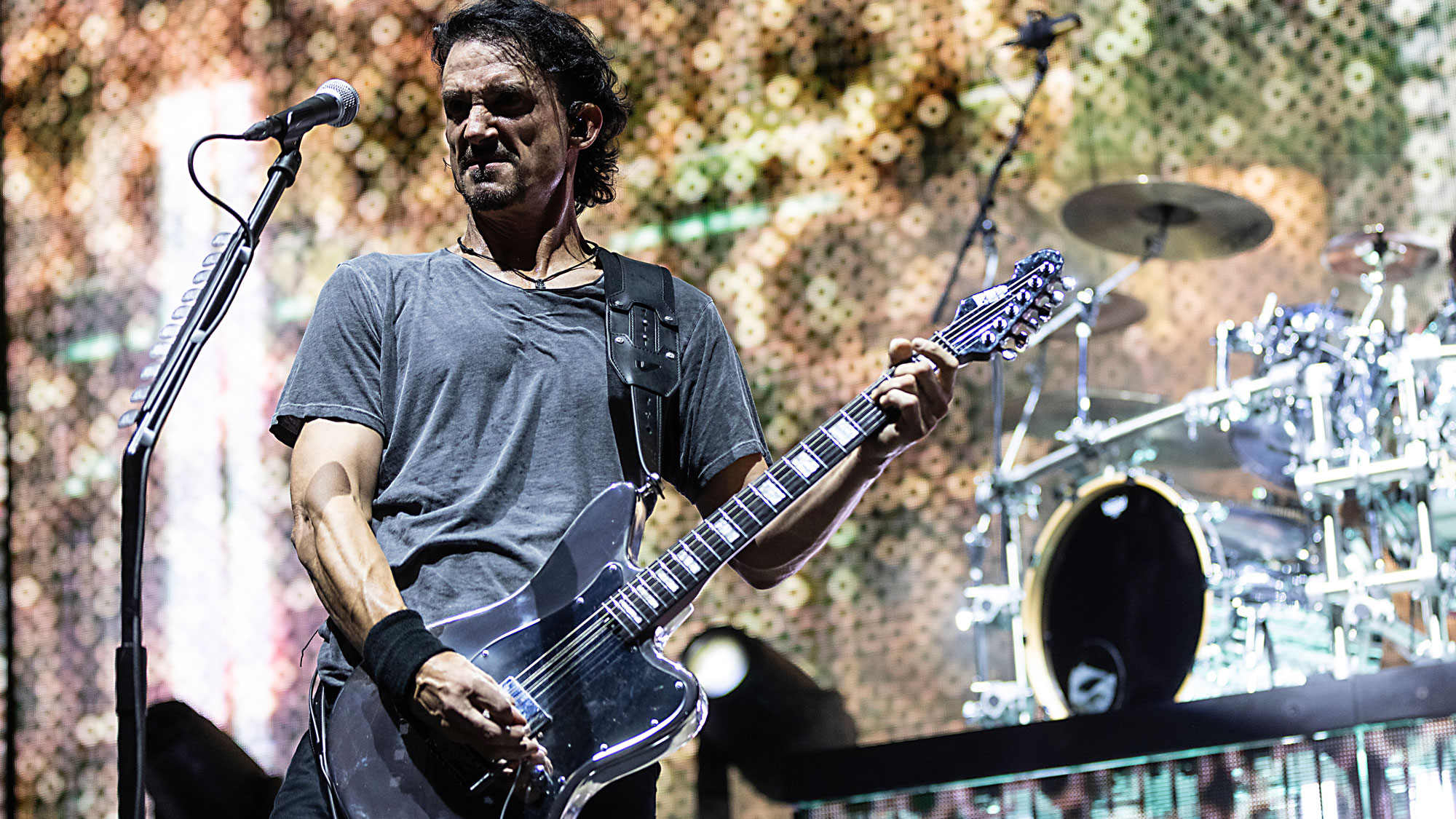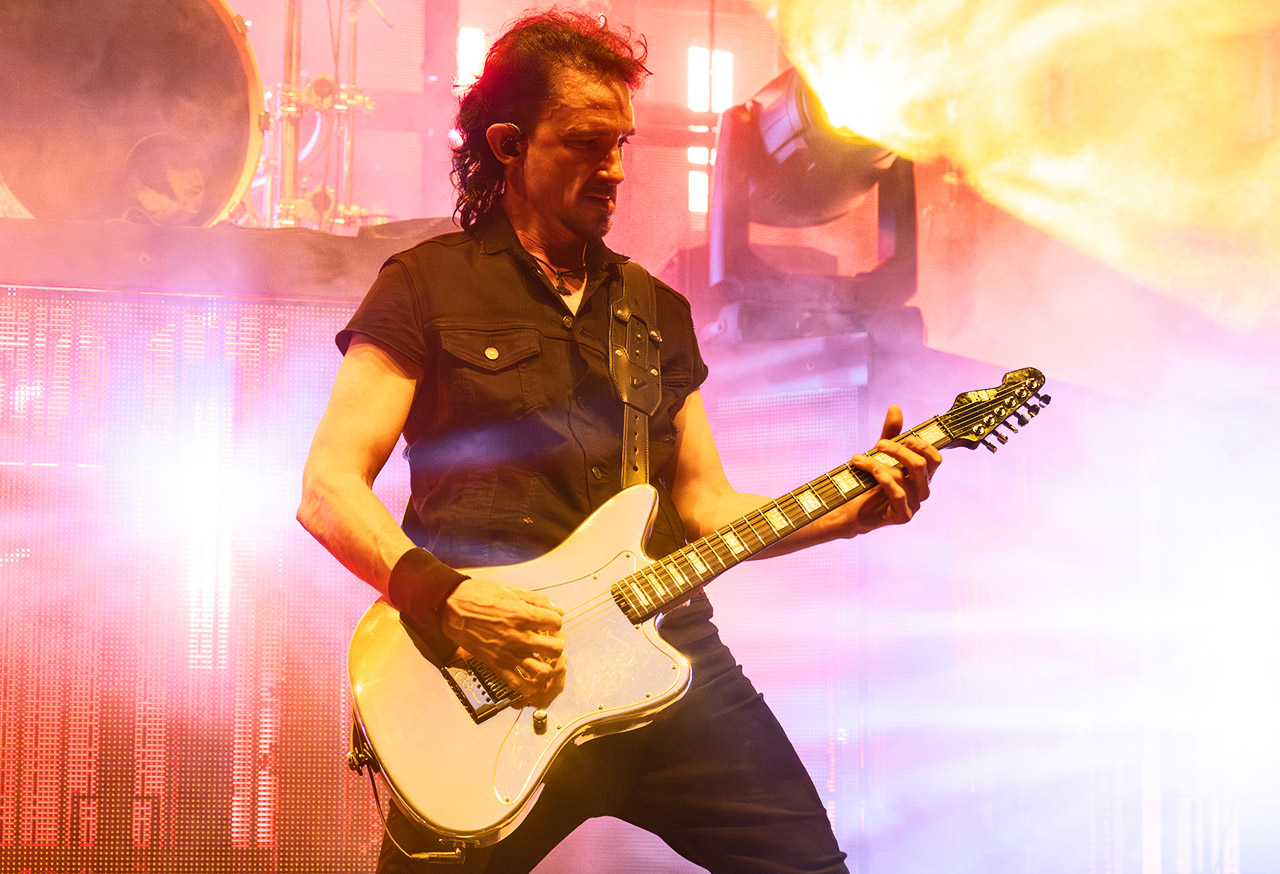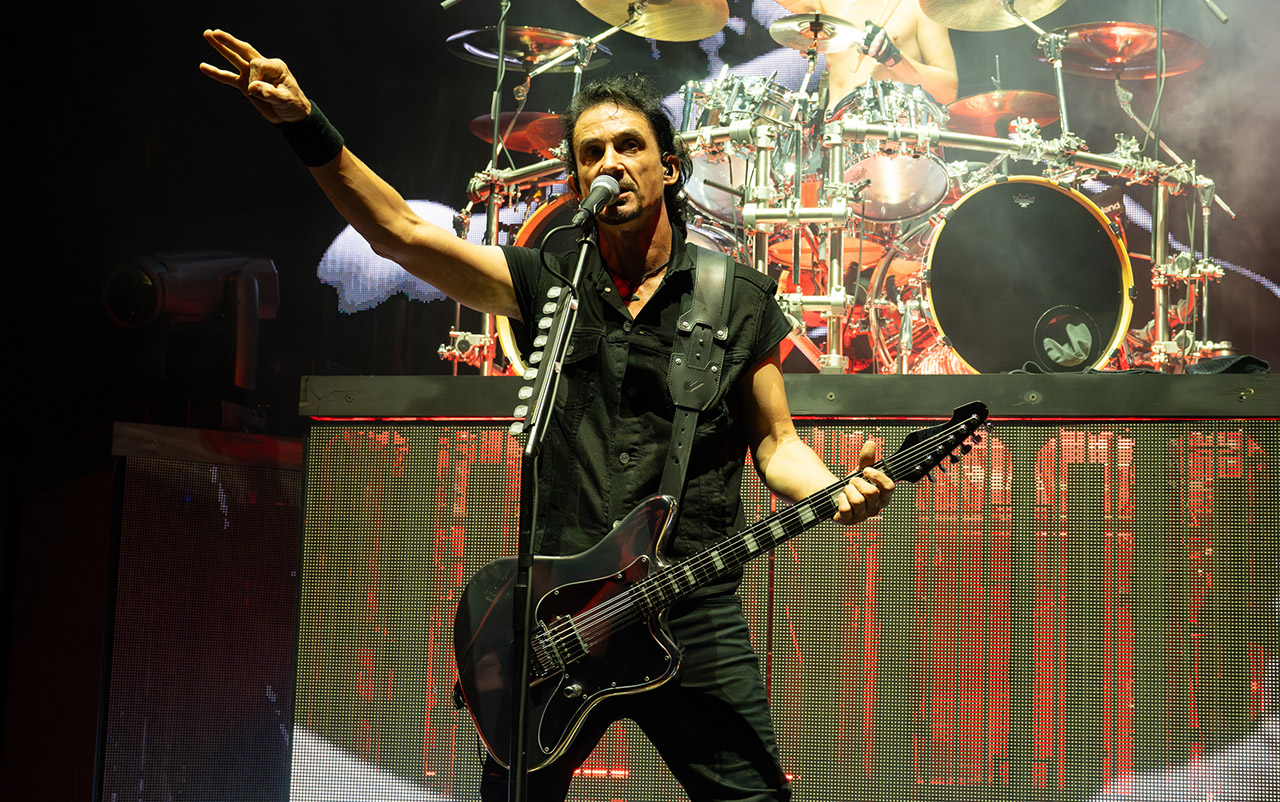“I can’t believe the pick scrape became a thing. It was born by mistake”: Gojira’s Joe Duplantier on the origins of his trademark technique, playing Ozzy Osbourne’s final show – and what he’s got cooking with ESP
As the frontman looks back at 20 years of Gojira’s groundbreaking From Mars to Sirius, he explains why switching guitar brands is not like having an affair, and how he learned about Ozzy Osbourne’s death as the band were midway through a show

All the latest guitar news, interviews, lessons, reviews, deals and more, direct to your inbox!
You are now subscribed
Your newsletter sign-up was successful
Born with an ability to conjure riffs that feel powerful enough to stop time and propel you to the outer limits of space, Gojira frontman Joe Duplantier is one of the most potent forces in modern metal.
Over the past two-and-a-half decades his band have risen out of the French underground and onto the world’s biggest stages, opening for the likes of Metallica, Iron Maiden and Slipknot, with some of their more recent high-profile shows being last year’s Olympics opening ceremony in Paris and last month’s Black Sabbath Back To The Beginning farewell in Birmingham.
This year marks the 20th anniversary of their third album From Mars To Sirius – a release that changed their lives and redefined extreme metal in the process. Its 12 tracks are a perfect equation of ferocious intelligence and inescapable heaviness: labyrinthine and bewildering in places and staggeringly resolute and direct in others.
It’s also a conceptual masterpiece honoring the mysteries of the natural world surrounding us – inspiring existential dialogues about our role on Earth as architects of environmental disequilibrium, pollution and cataclysmic climate change. All these years later, the music and the message behind it remains just as, if not even more, relevant.
“It all started when I had this spiritual revelation around the age of 20,” says Duplantier. “I began to look at the planet differently. People take it for granted, thinking you live where you live and drive on whatever side of the road. But the more you look , you start to understand we’re on a rock floating through space. Nobody knows what the fuck is going on!”
Given the state of the world, it can be quite comforting to take a kind of bird’s eye view.
“There are many dimensions where humanity’s political and mental concerns don’t exist – dimensions where plants, animals, waves and clouds live. I was into all of that. It grew even more going into The Link, where I looked at our purpose in the universe. It’s real spirituality rather than religious spirituality, contemplating how deeply complex the world is.
All the latest guitar news, interviews, lessons, reviews, deals and more, direct to your inbox!
“Matter is just a bunch of particles vibrating at certain frequencies. There’s no up and down; no north and south. These are human constructs. I started to read about the intelligence of whales moving across the earth following routes that scientists cannot explain. I explored that on From Mars To Sirius.”
Speaking of vibrations and frequencies, what do you remember about the recording process?
“Everything, because I’m more of a producer than a musician. We worked with our sound guy at the time, Laurent Etchemendy. I jumped behind the console and started mixing with the help of our bass player Jean-Michael.
“It was a three-man operation. We were listening to Metallica, Morbid Angel and Fear Factory – anything that sounded decent – analyzing the shit out of it. We wanted to make a metal-sounding album, but it all went south!”
How do you mean?
“We put weird reverb, EQs and panning on the guitars. Everything sounded unorthodox – we were hungry to make it sound good, but I’d never studied mixing. I cringe a bit now because I know I’d do things differently. The album was a bunch of mistakes put together, but when you talk about art, the word ‘mistakes’ shouldn’t exist. It’s good to be original and follow your heart.”
What kind of rig did you have in the studio?
“I’d love to say it doesn’t matter and you can do anything with whatever, but it was my Jackson SLS. They weren’t on my radar before, but we were broke at the time. So when Jackson asked if we wanted free guitars the answer was, ‘Fuck yeah!’
“I used them for years until I got curious. Jackson was a big part of our lives. We had Mesa/Boogies on The Link, but switched to Peavey 5150s because a lot of metal bands were using them for crushing tones.

“We were not trying to be original. Everyone thinks we were trying to invent something new – but we just wanted to sound fat and modern. The album ended up original because we were weird French guys from a village with no scene.”
Songs like Ocean Planet and Flying Waves are notable for the pick scrape technique that many other bands ended up stealing. How did you come up with it?
“Somebody, somewhere is probably making that sound as we speak! I can’t believe it became a thing. I don’t think we invented it, to be honest – there’s a Morbid Angel song on Formulas Fatal To The Flesh that sounds close.
“It was born by mistake on The Link tour. We had a song called Embrace The World where I did this downwards slide on the high strings from the 12th fret, followed by a classic pick scrape. It was hard to reproduce because the song is fast.
“I was caught in a trance somewhere in Switzerland. Instead of playing it normally, I did something else, and it felt magical so I did it again and again. Funnily enough, moving the fretting hand is mostly for show – it doesn’t do shit! You can do it with just your picking hand. By the time we recorded From Mars To Sirius, the pick scrape ended up everywhere and became my thing.”
Those tracks also have riffs using octave shapes instead of power chords with the fifth in between.
“Standard power chords would have sucked. I remember someone was like, ‘Dude, you’re hurting my ears – put the fifth in!’ But that was boring. I wanted it to sound like an alarm; an uncomfortable thing like a truck going backwards. Once you add bass, drums and vocals, boom!
“It’s nice for guitars to be a little free sometimes. World To Come has moments like that, as does To Sirius. I’m glad you asked, because nobody brings this shit up enough! That’s what makes the sound of this album for me, even more than the scrapes.”
A fan put his phone up as we were playing. It said, ‘RIP OZZY.’ I was like, ‘What the hell?’
As a mission statement, The Heaviest Matter of the Universe certainly lives up to its name.
“I love playing that song. It’s all about letting energy out. There’s a dumb aspect in terms of how it goes from two stabs to three and then half time. But that’s what’s good about it. This album was born out of loud, passionate jamming.
“We didn’t care about being the heaviest band in the universe, we just wanted to create the heaviest sound in the universe. If nobody got it, we didn’t care. The goal was to create something that transcended us and made people feel alive. It’s my number one song and it’s been our champion ever since. Actually, I need to talk to my brother Mario because he took it off our current setlist!”

What do you remember about Back to the Beginning?
“Every second! We were invited to be part of that iconic photo with Ozzy, but we couldn’t go because we were rehearsing in London – all the spaces in Birmingham were booked. I met Ozzy very briefly on the day. We stared at each other for a second and I was thinking, ‘Oh god, it’s the Prince of Darkness!’
“What an honor it was to play. Just thinking about it makes me want to cry. Somehow, the way Ozzy left us was absolutely impeccable. I’m sure it’s the way he wanted. He said goodbye to the fans, made headlines – and then boom, he was out of here.”
Where were you when you were told about his death?
“We were playing in Istanbul. Three songs in, a fan put his phone up as we were playing Backbone. It said, ‘RIP OZZY.’ I was like, ‘What the hell? Please don’t – I’m working up here!’ Then I wondered if it was real. When I got the chance, I rushed to the side and my manager confirmed it was true.
“I told the crowd pretty straight; I didn’t want to make a gimmick out of it. The reaction was insane: nobody said a word. We played Flying Whales for Ozzy as everyone held up their lights. I could see people crying.”

Did you play your cover of Under the Sun that night?
“We never do covers – but our plan had been to play Black Sabbath later in the set. How crazy is that? It was very powerful. Since then I’ve been having a revival, listening to all the classics. Ozzy was such a character. I’ll be in Birmingham soon to soak up all the energy there. I also want to buy a black SG while I’m over.”
On the subject of new guitars, a lot of people were wondering about you switching from Charvel to ESP for the Olympics performance.
“People talk about instruments almost like marriage – ‘How could you? I thought everything was going well!’ It’s not like that, okay? Can everybody relax?! I love Charvel and I’m proud of the signature we made. Nothing went wrong. But I’m just a dude who wants to have fun and try new things.
Hetfield personally hooked me up with them. He actually picked up the phone and said, ‘Dude, have you tried an ESP?’
“From Fender to Gibson, I just love guitars. I’ve had a relationship with ESP for years. Hetfield personally hooked me up with them. He actually picked up the phone and said, ‘Dude, have you tried an ESP?’
“I still use my signature Charvel on stage, and I’ll continue to. I just wanted to experiment in other fields. It feels like I’m expanding, and ESP have a lot to offer. I’m not cheating on anyone – I want all the instruments!
“The Metallica connection was a big part of it. Bill from Mastodon loves ESP and I’ve played his guitar a bunch of times. I’ve talking to [artist relations head] Tony Rauser about making something different to what I’ve done before.
“I’m in a phase of life where I accept myself more as a frontman. I used to go on stage with dark shirts, jeans and guitars, looking like a black hole. I don’t know if it’s a midlife crisis, but enough is enough – I want to shine on stage! Maybe I’ll design a mirror guitar, so I can blind people with the spotlight!”
Amit has been writing for titles like Total Guitar, MusicRadar and Guitar World for over a decade and counts Richie Kotzen, Guthrie Govan and Jeff Beck among his primary influences as a guitar player. He's worked for magazines like Kerrang!, Metal Hammer, Classic Rock, Prog, Record Collector, Planet Rock, Rhythm and Bass Player, as well as newspapers like Metro and The Independent, interviewing everyone from Ozzy Osbourne and Lemmy to Slash and Jimmy Page, and once even traded solos with a member of Slayer on a track released internationally. As a session guitarist, he's played alongside members of Judas Priest and Uriah Heep in London ensemble Metalworks, as well as handled lead guitars for legends like Glen Matlock (Sex Pistols, The Faces) and Stu Hamm (Steve Vai, Joe Satriani, G3).
You must confirm your public display name before commenting
Please logout and then login again, you will then be prompted to enter your display name.



